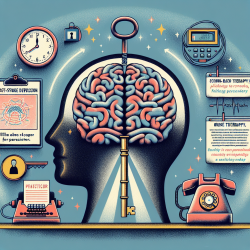Introduction
In the realm of global mental health, the involvement of non-specialist providers is pivotal to extending mental health services to underserved populations. This task-sharing approach, however, presents the challenge of ensuring that these non-specialists maintain clinical competence. The research article "Development of a scoring system for non-specialist ratings of clinical competence in global mental health: a qualitative process evaluation of the Enhancing Assessment of Common Therapeutic Factors (ENACT) scale" by Kohrt et al. (2015) addresses this challenge by developing a tool for non-specialist peer ratings of clinical competence.
Understanding the ENACT Scale
The ENACT scale is an 18-item tool designed to evaluate the competence of non-specialists in delivering mental health services. It was developed through a systematic process in Nepal, aimed at optimizing feasibility and utility among non-specialist peer raters in low-resource settings. The tool was pilot-tested with non-specialists participating in mental health Gap Action Programme trainings, and its development was informed by qualitative process evaluations.
Key Findings and Recommendations
The research identified five key challenges in developing non-specialist peer rating tools:
- Balancing Training and Research Objectives: The tool must serve both as a research instrument and a training aid, emphasizing its role in quality improvement.
- Burden on Peer Raters: The number of scale items and response options should be limited to reduce cognitive load and improve usability.
- Hierarchy of Clinical Skills: The tool should capture a progression of skills, from basic to advanced, within its scoring system.
- Objective vs. Subjective Ratings: Detailed scoring descriptions help minimize subjectivity and ensure consistent ratings.
- Social Desirability Bias: The tool's design should encourage honest and constructive peer ratings.
Implications for Practitioners
For practitioners, the ENACT scale offers a structured approach to assess and improve clinical competence. By focusing on common therapeutic factors, practitioners can enhance their skills in empathy, client interaction, and collaborative goal setting. The tool's design also encourages ongoing training and supervision, ensuring that non-specialists continue to develop their competencies.
Encouraging Further Research
While the ENACT scale provides a robust framework for evaluating clinical competence, further research is needed to explore its applicability in high-resource settings and its impact on client outcomes. Practitioners are encouraged to engage with this research to refine their skills and contribute to the development of effective task-sharing models in mental health care.
To read the original research paper, please follow this link: Development of a scoring system for non-specialist ratings of clinical competence in global mental health: a qualitative process evaluation of the Enhancing Assessment of Common Therapeutic Factors (ENACT) scale.










